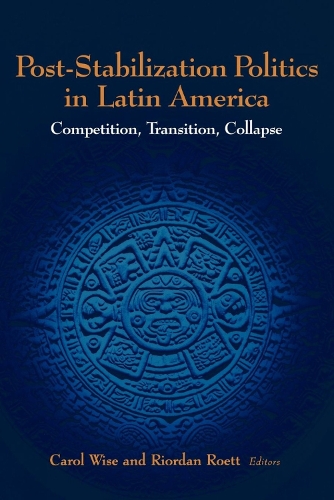
Post-Stabilization Politics in Latin America: Competition, Transition, Collapse
(Paperback)
Publishing Details
Post-Stabilization Politics in Latin America: Competition, Transition, Collapse
By (Author) Carol Wise
Edited by Riordan Roett
Bloomsbury Publishing PLC
Brookings Institution
28th July 2003
United States
Classifications
Professional and Scholarly
Non Fiction
Central / national / federal government policies
Political economy
Development studies
Development economics and emerging economies
320.98
Physical Properties
Paperback
324
Width 152mm, Height 229mm, Spine 21mm
435g
Description
Since the early 1980s Latin America has seen a definitive shift toward civilian rule. Significant trade, fiscal and monetary reforms have accompanied these changes, exposing previously statist economies to the forces of the market. Despite the conventional notion that liberal economic reforms sprang out of necessity, as opposed to an enlightened set of policy choices, the combination of civilian regimes and market-based strategies has proved to be resilient. Economic and political hardships remain, including a debt default in Argentina and an attempted coup in Venezuela; however, the defining themes of open market and liberal politics still dominate in the region. This volume focuses on the effects of market reforms on domestic politics in Latin America. Taking civilian rule as a constant, the contributors examine six countries (Argentina, Brazil, Chile, Mexico, Peru and Venezuela) that embraced similar packages of reforms in the 1980s and explore the variation in domestic political responses to these reforms. Specifically, the authors focus on how ambitious reform measures - liberalization, privatization and deregulation - yielded mixed results among these countries. They uncover three principal trends: that of Argentina and Chile, where the implementation of market reforms and increasingly competitive politics have gone hand in hand; that of Brazil and Mexico, where market reforms catalyzed transitions from entrenched authoritarian rule; and that of Peru and Venezuela, where traditional political systems have collapsed and civilian rule has been repeatedly challenged.
Reviews
"Expertly compiled and deftly co-edited...
Scholarly essays by a diverse authority of learned authors informingly and challengingly explore the complex interworkings of economy and government in an astute and insightful manner. POST-STABILIZATION POLICITS IN LATIN AMERICA is a core addition to professional and academic library Latin American Studies reference collections." The Bookwatch, 2/1/2004
"Wise and Roett bring together a group of leading scholars to take a hard look at [the] intersection of economic policymaking and politics. In this excellent volume, which examines cases of Brazil, Argentina, Chile, Mexico, Peru, and Venezuela, they argue that the ultimate viability of market reform lies in the construction of a more credible structure of democratic governance." Kenneth Maxwell, Foreign Affairs, 11/1/2003
|"POST-STABILIZATION POLITICS IN LATIN AMERICA embraces a comprehensive group of articles that address the complex historical, political, and economic issues of transformations experienced by Latin American countries over the last few decades. The ten authors are well-known political science scholars with publications on Latin America that highlight aspects of political science, economics, sociology, and international relations that are relevant to the understanding of these issues by both professionals and students." Miguel A. Rodriguez, George Washington University, Perspectives on Political Science, 1/1/2004
|"[The book's] strength lies... in the fact that the chapters are rich and thoughtful, and generally reflect the complexities that attach to market reform and democratisation." Jean Grugel, University of Sheffield, Journal of Latin American Studies, 11/1/2004
Author Bio
Carol Wise is associate professor of international relations at the University of Southern California. Her most recent books include Reinventing the State: Economic Strategy and Institutional Change in Peru (Michigan, 2003). Riordan Roett is Sarita and Don Johnston Professor at the Paul H. Nitze School of Advanced International Studies at Johns Hopkins University, where he directs the Western Hemisphere Studies and Latin American Studies Programs. He is the author or editor of twenty-two books, including China's Expansion into the Western Hemisphere (Brookings, 2008). His textbook Brazil: Politics in a Patrimonial Society is now in its fifth edition.
